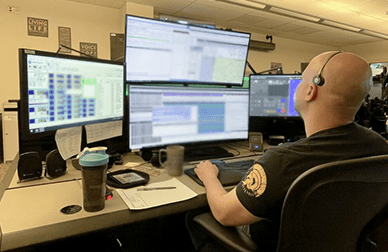Communications
The Douglas Regional 911 Communications Center provides emergency dispatch services for law enforcement, fire, and emergency medical services. Our staff is trained and prepared to handle emergencies called into the center every day. Douglas Regional 911 Communications Center and staff have received numerous awards, both locally and nationally, including CALEA accreditation.
Our communications staff is trained and certified in a nationally recognized Emergency Medical Dispatch system, Tactical and All-Hazards Dispatch, Hazardous Materials, Incident Command, CCIC/NCIC, and a number of other specialized areas.
In addition to Douglas County Sheriff’s Office, we dispatch for fourteen other agencies throughout Douglas and Elbert Counties, who contract with DCSO for dispatching services:
- United Fire Dispatch Authority, which consists of the Castle Rock, Franktown, Jackson 105, and Larkspur fire departments.
- Elbert County Communication’s Authority consists of Elbert County Sheriff’s Office, Simla, and Elizabeth police departments, as well as, Elizabeth, Elbert, Rattlesnake, Big Sandy/Simla, Kiowa, North Central, and Agate fire departments.
Public safety dispatching for law, fire, and EMS is complex. Dispatchers are required to be cross-trained and proficient with many computer systems and programs including but not limited to:
- 911 phones
- Radio and telephone recording/logging systems
- Computer Aided Dispatch (CAD)
- Emergency Medical Dispatching
- CCIC/NCIC
- Various mapping software
- 700/800mhz radios, Colorado Statewide Digital Trunked Radio System
- First-In alerting
- Pictometry
- Code RED Emergency Mass Notification System
- Text-to-911
- RapidSOS
Douglas County Emergency Telephone Service Authority (DCETSA) is a separate legal entity, responsible for funding the purchase and maintenance of the Douglas County 911 Authority network. DCETSA funds the costs of providing 911 emergency communication services. This includes specialized training for our telecommunicators, as well as equipment and maintenance necessary to provide these critical services for our citizens.




